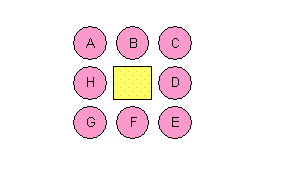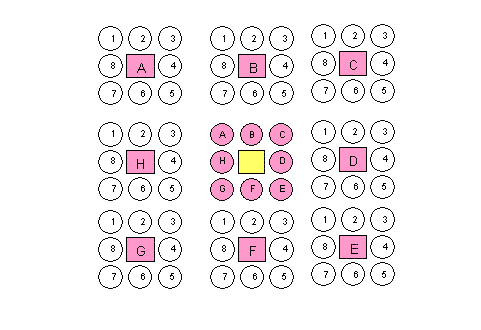The Lotus Blossom technique was originally developed
by Yasuo Matsumura, Director of the Clover Management Research (Japan).
This technique is based upon the use of analytical capacities and helps
to generate a great number of ideas that will possibly provide the best
solution to the problem to be addressed by the management group.
It can be broken down into six major steps:

Figure 3-10: Lotus blossom
1. Draw up a lotus blossom diagram (Figure 3-10) made up of a square in the center of the diagram (the pistil) and eight circles (petals) surrounding the square;
2. Write the central idea or problem in the center of the diagram (yellow
square);
3. Look for ideas or solutions for the central theme. Then write them
in the flower petals (pink circles).
Example 1
The main idea of a company was to “build a creative atmosphere within the company”. The company managers wrote this statement in the center of a lotus blossom.
Afterwards, during a debate, they devised eight ideas about the main theme: >- “Offer contexts for ideas”;These ideas were written in the circles all round the main square;
- “Create a challenging atmosphere”;
- “Organize meetings of creative thinking”;
- “Generate paths to get out of the box”;
- “Generate a positive attitude”;
- “Make up a creativity board”;
- “Make the job funny”;
- “Expand the meaning of job”.
4. Each idea written in the circles becomes the central theme of a new
lotus blossom (Figure 3-11):

5. Follow step 3 with all central ideas;
6. Continue the process until all ideas have been used.
Example 2
This technique helped the above-mentioned company to create many interesting
ideas. Among the others, they set up a special room for creative thinking
which was furnished with creativity books, videos, educational toys
and so on. Moreover, it was decorated with drawings made by the personnel’s
children, to remind that everyone was born innocent and creative.
- Michalko M., Thinkpak, Berkeley, California, Ten Speed Press, 1994.
- Michitti M., Left-brained Marketers Can Achieve Creativity, Marketing News, Vol. 31, n. 7, 1997, pp. 14-19.